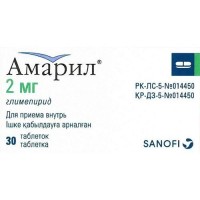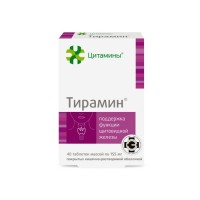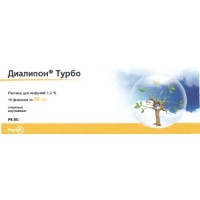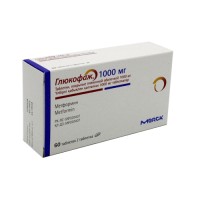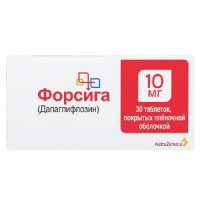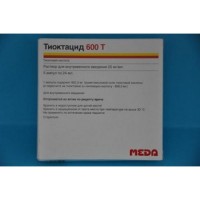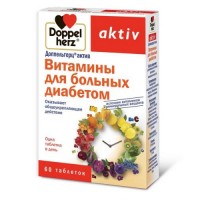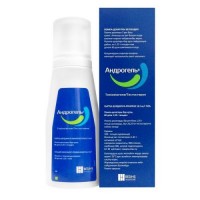Minirin Melta 60 mg oral lyophilisate 30s
- $86.20
The instruction for medical use of MINIRIN MELT medicine the Trade name Minirin of MELT the International unlicensed name Desmopressin Dosage Form Lyophilisate of oral, 60 mkg, 120 mkg, 240 mkg Structure One lyophilisate contains active agent - desmopressin acetate (it is equivalent to desmopressin to the basis) 60.00 mkg, 120.00 mkg and 240.00 mkg excipients: gelatin, Mannitolum, anhydrous citric acid. The description Lyophilisate of white color, round shape with marking in the form of one drop on one party (for a dosage of 60 mkg). Lyophilisate of white color, round shape with marking in the form of two drops on one party (for a dosage of 120 mkg). Lyophilisate of white color, round shape with marking in the form of three drops on one party (for a dosage of 240 mkg). Pharmacotherapeutic group Gipotalamo-hypophyseal hormones and their analogs. Hormones of a back share of a hypophysis. Vasopressin and its analogs. Desmopressin. The ATX H01BA02 code the Pharmacological Pharmacokinetics Bioavailability properties of desmopressin at sublingual reception of 200, 400 and 800 mkg makes 0.25% (in 95% of cases the confidence interval makes 0.21-0.31%). The maximum concentration in blood plasma is reached within 0.5-2.0 hours after administration of drug. Concentration in plasma is directly proportional to the size of the accepted dose, after reception of 200, 400 and 800 mkg of Cmax. makes 14, 30 and 65 pg/ml, respectively. Elimination half-life of 2.8 hours (CV=24%). Desmopressin does not get through a blood-brain barrier. Drug is removed by kidneys. The concomitant use of food can reduce absorption level from a food path to 40%. A pharmacodynamics Minirin Melt – a structural analog of natural hormone arginine - vasopressin which is received as a result of changes in structure of a molecule of vasopressin – deamination of L-cysteine and substitution of 8-L-arginine with 8-D-arginine. These structural changes in combination with considerably the enhanced antidiuretic activity have less significant influence on smooth muscles of vessels and internals in comparison with vasopressin that causes lack of undesirable spastic side effects and longer action. Drug increases permeability of an epithelium of distal departments of wavy tubules for water and raises its reabsorption. Use of drug in not diabetes leads to reduction of volume of the emitted urine, and at the same time to increase in its osmolarity and decrease in osmolarity of blood plasma. It leads to decrease in frequency of urination and reduction of a nocturia. Reception of 60-120 mkg of drug in most cases provides antidiuretic effect within 8-12 hours. Indications - not diabetes of the central genesis - treatment of primary night enuresis - the nocturia connected with a night polyuria at adults (symptomatic treatment) the Route of administration and doses Minirin Melt accept sublingual. The optimum dose is selected individually. A dosing ratio between Minirin Melt, lyophilisate of oral 60 mkg, 120 mkg and 240 mkg and Minirin tablets of 0.1 mg and 0.2 mg are given in the table. The Dosage form lyophilisate peroral the tablets Dosing of 60 Mkg 0.1 Mg 120 Mkg 0.2 Mg 240 Mkg 0.4 Mg Drug accept the name of the drug Minirin Melt Minirin through some time after meal as meal can influence absorption of drug and its efficiency. Not diabetes of the central genesis. The dose is defined individually for each patient. The recommended initial dose for children and adults makes 60 mkg 3 times a day, sublingual. Further the dose can be korrigirovat depending on reaction of the patient to treatment. The daily dose is usually equal to 120-720 mkg. For most of patients the optimum maintenance dose makes 60-120 mkg 3 times a day. In case of symptoms of a delay of liquid and/or a hyponatremia, treatment it is necessary to stop and modify a dosage. Primary night enuresis. Children (5 years) and adults (up to 65 years are more senior) with normal concentration ability of kidneys: the recommended initial dose - 120 mkg before going to bed, sublingual. In case of insufficient effect the dose can be increased up to 240 mkg. During treatment it is necessary to limit intake of liquid at night. At emergence of symptoms of a delay of liquid and/or a hyponatremia (headache, nausea/vomiting, increase in body weight, a spasm) the treatment needs to be suspended until the condition of the patient is not normalized. The recommended duration of treatment is 3 months then within 1 week estimate need of carrying out a repeated course. The nocturia connected with a night polyuria at adults (symptomatic treatment). The recommended initial dose - 60 mkg before going to bed, sublingual. In case of insufficient effect in a week the dose is increased to 120 mkg and further if necessary up to 240 mkg. Increase in a dose needs to be made at an interval of 1 week. During treatment it is necessary to limit intake of liquid Prior to therapy at patients with a nocturia at night it is necessary to estimate the frequency and volume of urination within not less than 48 hours prior to treatment. Mocheotdeleniye at night, 1/3 daily urines exceeding the functional capacity of a bladder, or making, is considered a night polyuria. In addition, level of serumal sodium it is necessary to define before an initiation of treatment. Body weight should be checked within several days in an initiation of treatment and after increase in a dose. The concomitant use of food can reduce intensity and duration of antidiuretic action of low doses of desmopressin. Treatment of elderly patients is not recommended. If, nevertheless, therapy needs to be performed, it is necessary to determine levels of serumal sodium before an initiation of treatment, in 3 days after an initiation of treatment, in 3 days after increase in a dose and also on other necessary temporary points. At emergence of symptoms of a delay of liquid and/or a hyponatremia (a headache, swell, nausea/vomiting, increase in body weight, a spasm) the treatment needs to be suspended until the condition of the patient is not normalized. After treatment resuming the patients need to monitor more carefully restriction of intake of liquid and to carefully control the level of serumal sodium. If within one week of reception of the corresponding dose the adequate clinical effect was not reached, treatment should be stopped. Treatment without parallel restriction of intake of liquid can lead side effects to a liquid delay in an organism / hyponatremia with or without the accompanying warning symptoms (a headache, nausea/vomiting, increase in weight and, in serious cases, the spasms sometimes connected with drowsiness up to a long loss of consciousness). It is applicable, in particular, to small children up to one year or to the elderly people depending on their general state. Often - a headache, dizziness - dryness in a mouth, an abdominal pain, nausea, vomiting, diarrhea - peripheral swell - increase in body weight - insomnia - arterial hypertension - a pollakiuria - fatigue, peripheral swelled Seldom - allergic reactions of skin, the general allergic reactions - a hyponatremia - emotional disorders at children - Contraindication spasms - hypersensitivity to desmopressin or other components of drug - an inborn or psychogenic polydipsia (with a volume of uropoiesis more than 40 ml/kg / 24 hour), alcoholism - swell a different etiology - the heart failure and other states demanding prescribing of diuretic drugs. Minirin Melt has to be used only at patients with the normal level of arterial blood pressure. - the hyponatremia - a renal failure (the clearance of creatinine is lower than 50 ml/min.) - a syndrome of inadequate secretion of antidiuretic hormone - children's age up to 5 years (not diabetes and primary night enuresis) - patients at the age of 65 years and is more senior if desmopressin is used for treatment of a nocturia and primary night enuresis Medicinal interactions of Substance which action can stimulate development of a syndrome of inadequate secretion of antidiuretic hormone, such as tricyclic antidepressants, selective serotonin reuptake inhibitors, Chlorpromazinum, carbamazepine and indometacin, can enhance antidiuretic effect of drug and increase risk of a delay of liquid in an organism and a hyponatremia. Non-steroidal anti-inflammatory drugs can induce a liquid delay in an organism / hyponatremia. The accompanying treatment by loperamide can increase concentration of desmopressin in blood plasma by 3 times that can increase risk of emergence of the side effects connected with a delay of liquid and a hyponatremia. There is a probability that other medicines which reduce a tone and motility of smooth muscles of intestines can have similar effect. Interactions of desmopressin with the substances influencing hepatic metabolism are improbable as desmopressin is not exposed to any considerable metabolism in a liver in laboratory researches on microsomes of the person. Researches under natural conditions on possible interactions were not conducted yet. The standardized diet from 27% of fats considerably reduces absorption (quantity and duration) of the desmopressin accepted inside. Concerning pharmakodinamichesky characteristics (mocheotdeleniye or osmolality) about any considerable action it was not reported. At low doses of desmopressin the concomitant use of food can reduce effect and duration of antidiuretic action. In case of the accompanying use of oxytocin it is necessary to take increase in antidiuretic action and lowering of perfusion of a uterus into account. Clofibratum, indometacin and carbamazepine can strengthen antidiuretic effect of desmopressin whereas glibenclamide can lower it. Combined use with dimetikony can lead to desmopressin absorption reduction. Special instructions Within treatment of primary night enuresis and a nocturia it is necessary to reduce intake of liquid to a minimum of one o'clock before introduction till next morning (at least, within 8 hours after introduction). Treatment without the accompanying restriction of intake of liquid can lead to a liquid delay in an organism and/or a hyponatremia with or without the accompanying warning symptoms (headache, nausea/vomiting, increase in body weight) and, in hard cases, to brain hypostasis, with misting of consciousness up to a loss of consciousness. Desmopressin should be used with care in a renal failure and/or cardiovascular diseases, bladder fibrosis. In chronic diseases of kidneys the antidiuretic effect of drug will be less, than usually. Serious violations of function of a bladder and a contracture of a neck of a bladder have to be excluded before treatment. Elderly patients and those who have low levels of serumal sodium have the increased risk of development of a hyponatremia. Treatment by desmopressin should be stopped in cases of development of the diseases which are characterized by disturbances of water and/or water-salt balance. Precautionary measures in order to avoid a hyponatremia have to be taken in cases: - the accompanying treatment by medicines which can induce a syndrome of inadequate secretion of antidiuretic hormone (SIADH), e.g., antidepressants, selective serotonin reuptake inhibitors, Chlorpromazinum and carbamazepine, - parallel treatment by non-steroidal anti-inflammatory drugs. Precautionary measures liquid have to be taken for prevention of an overload in cases: - risk of emergence of disturbances of balance of electrolytes and liquid, - risk of increase in intracranial pressure. Pregnancy and the period of a lactation With care are appointed at pregnancy and monitoring of arterial blood pressure is recommended. Use for pregnant women is possible only when the expected advantage for future mother exceeds potential risk for a fruit. In need of prescribing of drug during a lactation the feeding by a breast is stopped. Features of influence of medicine on ability to run the vehicle and potentially dangerous mechanisms Considering possible side effects, it is necessary to be careful. Overdose Symptoms: a liquid delay in an organism, a hyponatremia, a headache, nausea and, in hard cases, the water intoxication with convulsions which sometimes is followed by misting of consciousness up to a loss of consciousness. Treatment: dose decline, increase in an interval between single doses or termination of administration of drug, restriction of consumption of liquid and symptomatic treatment if necessary. At suspicion of hypostasis of a brain, immediate hospitalization in intensive care unit is required. Convulsions also demand intensive measures. The form of release and packing On 10 liofilizat place in blister strip packaging from a film of the polyvinylchloride and aluminum foil varnished. On 3 planimetric packs together with the instruction for medical use in the state and Russian languages place in a pack from cardboard. Storage conditions In original packing in the dry place at a temperature not higher than 25 wasps. To store out of children's reach! 4 years not to use a period of storage after the expiration date specified on packing. Prescription status According to the prescription the Producer of Katalent Yu.K. Svindon of Zidis Ltd, Great Britain the Name and the country of the organization packer Katalent Yu.K. Svindon of Zidis Ltd, Great Britain the Owner of the registration certificate of Ferring International Senter SA, Switzerland the Address of the organization accepting in the territory of the Republic of Kazakhstan claims from consumers on quality of products (goods) Representation "Ferring Pharmatsevtikals S.A." in Republic of Kazakhstan Republic of Kazakhstan Almaty, 050059 Al-Farabi Ave. 7, block 5A, office 131, BC Nurly Tau Ph. fax: +7 (727) 311-54-47
To develop
To develop

